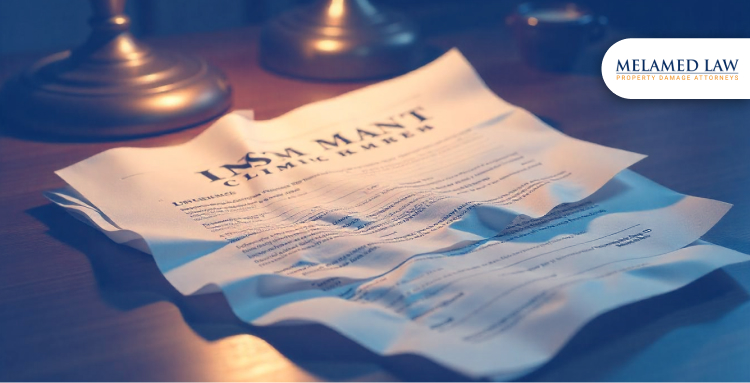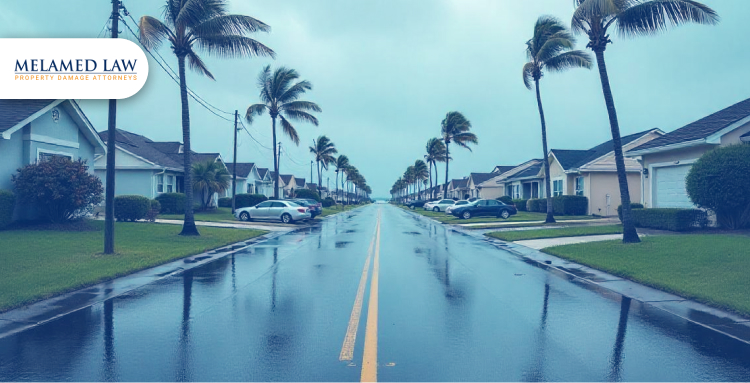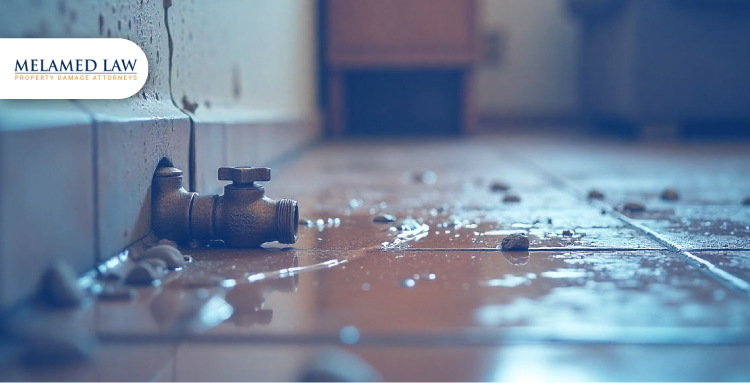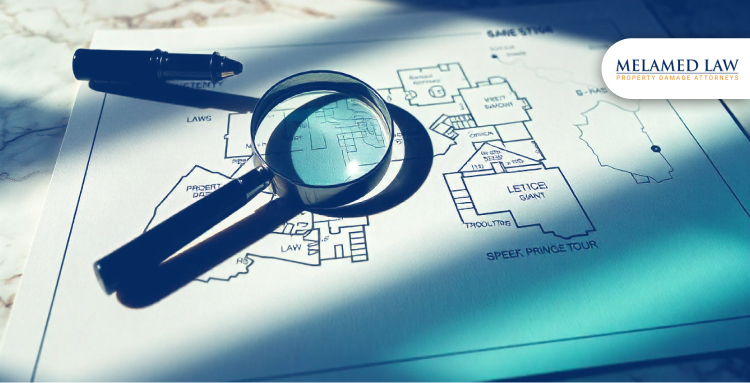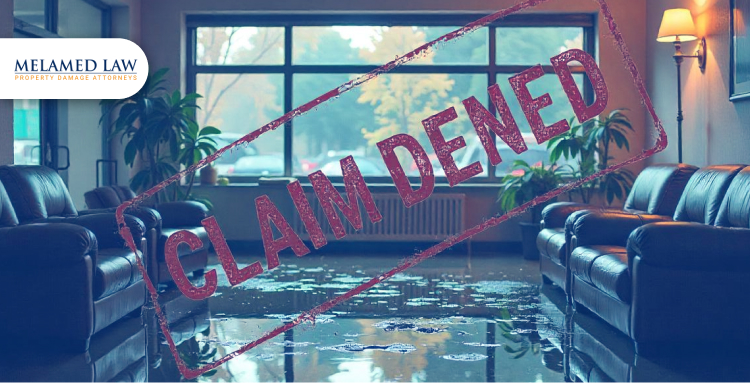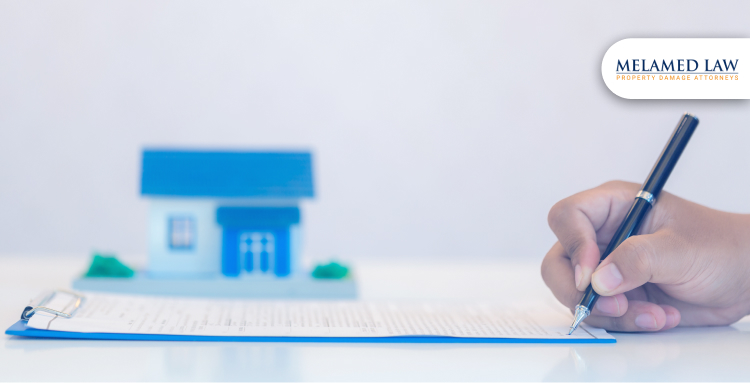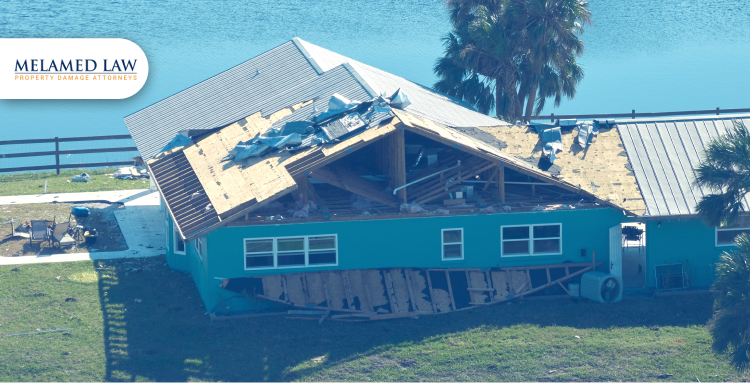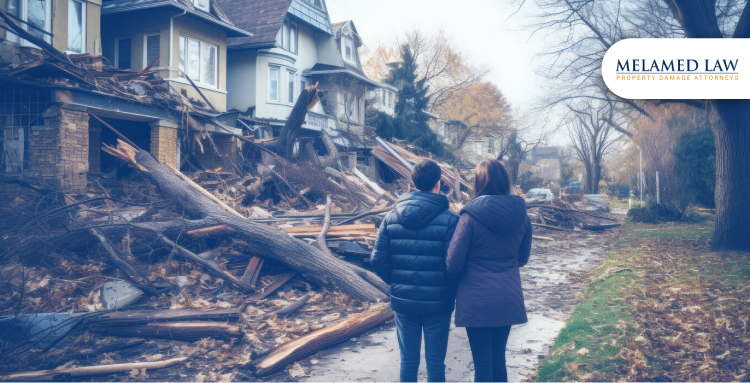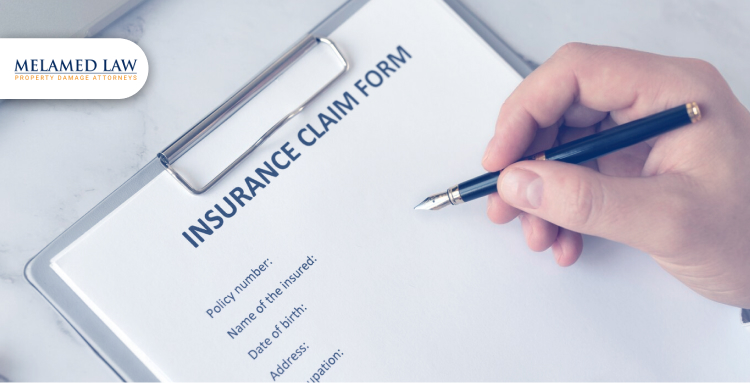
What are some common mistakes to avoid when filing a property damage claim?
When the unexpected happens, we help individuals and businesses collect the money they deserve for their insurance claims.
Melamed Blogs
March 20, 2025
What are some common mistakes to avoid when filing a property damage claim?

Isn’t it strange how, in the face of disaster, we’re expected to become experts in things we’ve never given much thought to before? One day, your home is your sanctuary, a place of comfort and safety. Next, it’s the subject of endless paperwork, photographs, and negotiations with insurance companies that seem to speak a language all their own. There’s a quiet absurdity to it—a collision of chaos and bureaucracy, where the stakes are heartbreakingly personal.
Let's explore the critical mistakes that many property owners unknowingly make when filing their claims, so you can protect your interests and ensure you receive the compensation you deserve for your property damage.
1) Common Mistakes to Avoid
Filing a property damage claim might seem straightforward, but several pitfalls can complicate the process.
➤ Delaying the Claim
Failure to meet these deadlines can result in your claim being denied outright or receiving significantly reduced compensation. Time is of the essence, and the longer you wait, the harder it may be to prove the extent of the damage, especially in the aftermath of widespread events like hurricanes or tropical storms.
To avoid this pitfall, it’s essential to report the damage to your insurance company as soon as possible. This prompt action complies with your policy's requirements and positions you to receive timely assistance and compensation.
Even if you are unsure of the full extent of the damage, initiate the claim process immediately and provide additional details as they become available. Keep records of all communications with your insurance company, and make sure to document the damage thoroughly with photographs and videos from the moment you notice it.
➤ Inadequate Documentation

Inadequate documentation is a common mistake that can seriously undermine your property damage claim. Without sufficient evidence, your insurance company might dispute the extent of the damage or, worse, deny the claim altogether. In Florida, where natural disasters like hurricanes frequently cause widespread damage, the burden of proof often falls on the policyholder to demonstrate the nature and scope of their losses.
To ensure your claim is supported by solid evidence, follow these steps:
Take clear photos and videos of all damages from multiple angles, including close-ups and wide shots for context.
Keep detailed records of all communication with contractors, including repair estimates and any receipts for temporary fixes.
Document the timeline of events, noting when the damage occurred and when each step in the claim process was taken.
➤ Making Unauthorized Repairs
Attempting to repair the damage before the insurance adjuster has assessed it can interfere with the insurer’s ability to accurately evaluate the damage. In Florida, insurers need to assess the full extent of the damage to determine appropriate compensation. Unauthorized repairs may lead to disputes or denials of claims.
To protect your claim, delay permanent repairs until after the adjuster's inspection. Document any temporary repairs thoroughly with photos and keep receipts for any materials purchased. This approach helps minimize additional damage while preserving the integrity of your claim and helps you in resolving property disputes quickly.
➤ Accepting the First Settlement Offer
Insurance companies often aim to settle claims quickly, which may result in an initial offer that is far lower than what you are entitled to. Accepting the first offer without a thorough review can lead to inadequate compensation, leaving you with unexpected out-of-pocket expenses or insufficient coverage for repairs.
Always review settlement offers carefully before accepting. Take time to compare the offer with your estimates for repair costs, replacement of personal property, and any temporary living expenses if necessary. Consider seeking professional advice from an attorney or public adjuster who can assess the fairness of the offer. It’s important to ensure that you’re not leaving money on the table.
Legal Recourse:
If you believe the offer is insufficient, you have legal options. Mediation and arbitration are common methods of resolving disputes without going to court, and they can often lead to better outcomes for policyholders.
If necessary, you may also consider litigation. Florida’s "bad faith" insurance laws allow for policyholders to sue their insurer for unfair settlement practices, providing a strong incentive for insurance companies to offer reasonable compensation.
➤ Providing Incomplete or Inaccurate Information

Insurance companies rely on the information you provide to assess the damage and determine the appropriate compensation. According to the National Association of Insurance Commissioners (NAIC), up to 20% of claim delays and denials are caused by discrepancies or incomplete details in the claim. This can range from failing to fully document the damage to misreporting the timeline or nature of the incident. Any inconsistency can raise red flags for the insurer and may even lead to a claim denial.
Provide precise and consistent details about the damage and clarify any uncertainties. Double-check your documentation, including photos, receipts, and estimates, to support your claim and avoid delays or disputes.
➤ Ignoring Policy Details
Ignoring or not fully understanding the details of your insurance policy can lead to costly mistakes when filing a property damage claim. Many policyholders are unaware of key exclusions or limits in their coverage, which can result in unexpected out-of-pocket expenses. For instance, in Florida, standard homeowner’s insurance often excludes certain types of damage, such as flooding, unless specifically added with a separate policy.
According to the Insurance Information Institute (III), a significant number of claims are denied or reduced because policyholders fail to understand the specifics of their coverage, such as limits on personal property or exclusions for certain natural disasters.
Therefore, review your insurance policy thoroughly, focusing on coverage, exclusions, and limits. Understand what is covered and consult your agent or a legal professional if needed. Regularly update your policy, especially after major changes, to ensure adequate coverage
2) Legal Considerations

Early recognition of bad faith practices, understanding how insurance law works, and proper documentation are essential for protecting your rights.
Florida's Insurance Laws
Policyholders in Florida are protected by comprehensive insurance regulations, primarily through the Florida Unfair Insurance Trade Practices Act (UITPA). This act establishes strict guidelines for insurance companies' conduct and prohibits deceptive practices. As a policyholder, you're entitled to prompt communication, fair claim handling, and written explanations for claim decisions. If you believe your insurer is acting in bad faith, you must file a Civil Remedy Notice (CRN), after which the insurance company has 60 days to resolve the issue before you can pursue legal action.
Bad Faith Insurance Practices
Insurance companies must operate in good faith and handle claims fairly. Florida follows a two-step process for bad faith claims: first establishing the insurance company’s liability and damages, then pursuing the bad faith claim itself. Examples of bad faith practices include unjustified claim denials, inadequate investigations, unreasonable delays in processing claims, or deliberately undervaluing damages. If proven, bad faith claims can result in additional compensation beyond the original claim amount, including consequential damages and attorney's fees.
How Melamed Law Helps You in Complicated Claims or Disputes
When dealing with complex property damage claims—such as extensive damages, multiple parties, or unclear causes—consulting an attorney early is crucial. Melamed Law, PLLC ensures that you act within critical deadlines, especially if your insurer denies your claim or offers insufficient settlements. Our team can help identify bad faith practices and guide you through mediation, arbitration, or litigation when needed.
Our legal team guides you through filing your claim and pursuing all available legal remedies, ensuring you don't miss out on the compensation you deserve. Contact us today for a free consultation to secure the compensation you deserve.
Recent Cases
